Services
SALANGAI POOJA
Salangai Pooja is a significant ceremony that honors the salangai (ankle bells), considered the most sacred part of a dancer's attire. It is customary for a dancer to refrain from wearing the salangai and performing until after this ritual.
On an auspicious day, family and friends gather at a temple where the pooja is performed for the new salangai, and the guru presents it to the student(s). The special moment of the ceremony is when the guru personally ties the salangai to the student's feet, marking the first time the student wears it.
ARANGETRAM
The word "Arangetram" means "Ascending the stage".
A live orchestra performs with the dancer - a mridangam player, a singer, a violinist, a flautist, sometimes a veena player and the teacher to do the nattuvangam.
It is solo dance debut - that means it's the first time a student performs a Margam themselves. Margam - A traditional format for a Bharathanatyam dance performance that follows a specific order for presenting dance items.
- Alarippu: Simple rhythmic movements
- Jatiswaram: A dance item
- Shabdam: An introduction to abhinaya
- Varnam: An exploration of both aspects in details
- Padam & Javali: An expressive piece
- Thillana: A vibrant piece
THATTUKAZHI CLASSES
Thattukazhi (also spelled Thattukazhi or Thattakkazhi) is an important aspect of Bharatanatyam, one of the classical dance forms of India. It refers to a rhythmic and dynamic hand gesture that is used in Adavus (basic dance steps) to express particular footwork and rhythm patterns.
Thattukazhi is an essential part of Bharatanatyam as it helps dancers develop their technical skills, maintain rhythm, and embody the aesthetic principles of the dance form. Its practice builds a strong foundation for more advanced techniques, contributing to both the dancer’s physical strength and artistic expression.
NATTUVANGAM CLASSES
Nattuvangam is an essential art that a dancer should know to become a GURU or a skilled performer. It is a multitasking art as playing the nattuvangam and reciting the 'Jathis' (rhythmical patterns in dance) are done simultaneously. Thaus the art requires mathematical knowledge.
The art of nattuvangam constitute minute rhythm calculations that are relevant to the rhythmical calculation of 'Jathis' and 'Adavus'.
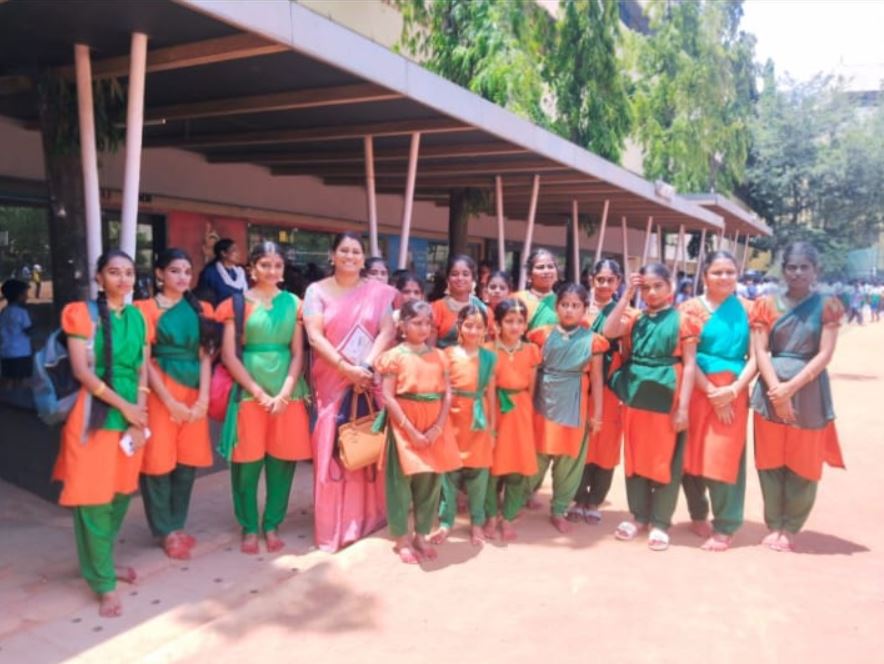
GRADE EXAM CERTIFICATION
Grade exams in Bharatanatyam are structured assessments that evaluate the dancer's skills, knowledge, and understanding of the dance form. These exams are often conducted by various dance institutions, governing bodies, or recognized organizations, and they serve as a benchmark for progress in Bharatanatyam training. The grading system varies across institutions, but most follow a similar structure of theoretical and practical evaluations. These exams ensure that dancers acquire a comprehensive understanding of both the technical and artistic aspects of Bharatanatyam.
TRAINING FOR GUINNESS ACHIVEMENTS
The concept of Guinness World Record training in Bharatanatyam usually refers to institutions or events where dancers attempt to set or break world records related to Bharatanatyam. These records could involve a variety of achievements, such as the largest number of participants performing Bharatanatyam simultaneously, the longest continuous performance, or the largest group performance of a specific item in Bharatanatyam.
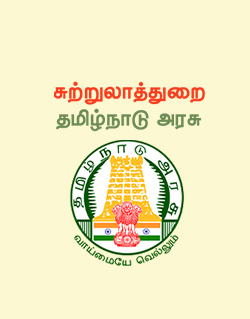
TAMILNADU GOVERNMENT PROGRAMS
The Tamil Nadu government frequently organizes Bharatanatyam programs to promote and preserve this classical dance form, an essential part of Tamil culture and heritage. These programs provide a platform for artists and students to showcase their talent.
ABROAD PROGRAMS
Abroad programs in Bharatanatyam are valuable for dancers looking to advance their technique, deepen their understanding of the dance form, and gain international exposure. Whether it’s through intensive workshops, masterclasses, or cultural exchange programs, these opportunities help Bharatanatyam practitioners refine their skills, connect with the global dance community, and experience the art form in a broader, cross-cultural context.
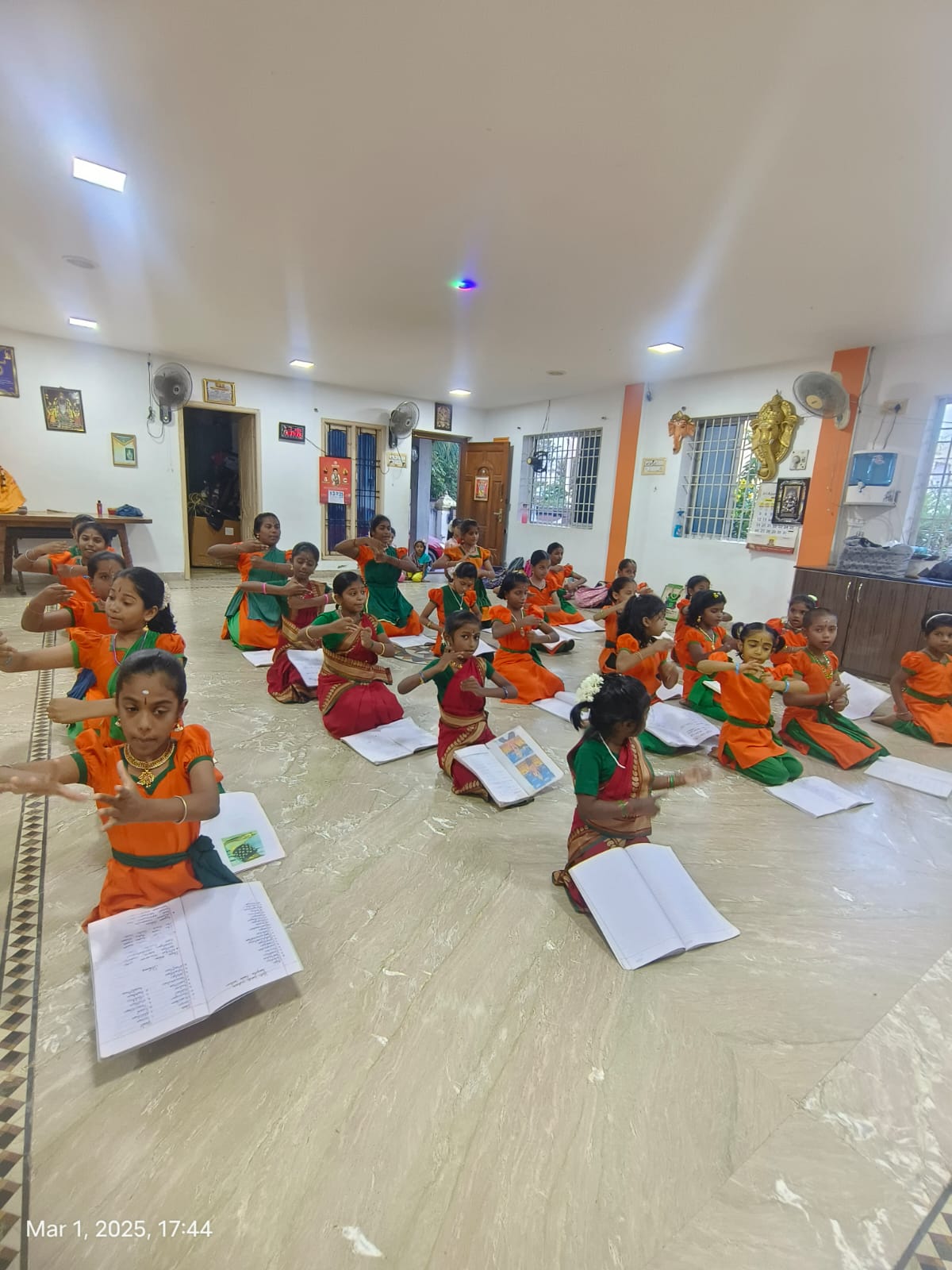
REGULAR CLASSES - FRESHERS
Starting Bharatanatyam as a fresher is an exciting journey, but it requires dedication, discipline, and consistent practice. Regular classes for beginners are essential to building a strong foundation in this classical dance form. These classes will cover the essential aspects of Bharatanatyam, helping you understand both its technical and artistic dimensions. Here's a breakdown of what a regular Bharatanatyam class for freshers typically involves:
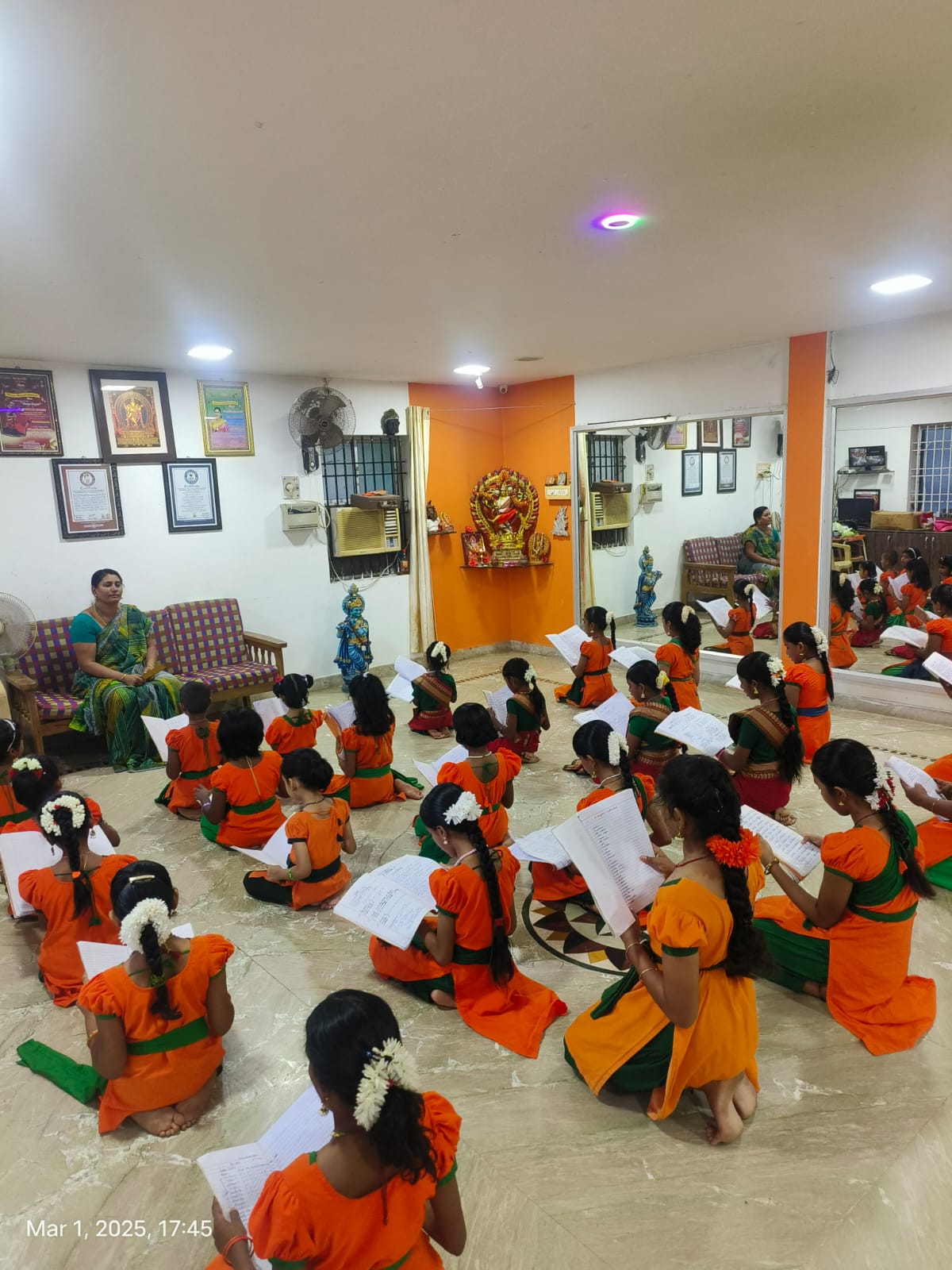
THEORY CLASSES
In Bharatanatyam, a classical Indian dance form, theory classes are as essential as practical training. These classes help students understand the historical, cultural, and technical aspects of the dance. While Bharatanatyam is traditionally a highly visual and performance-oriented art form, the theoretical study complements and deepens a dancer's practice.
Bharatanatyam theory classes provide dancers with the intellectual grounding needed to perform the dance form with deeper understanding and cultural appreciation. These classes are crucial for dancers to express emotions authentically and carry the art form's rich traditions into the future.
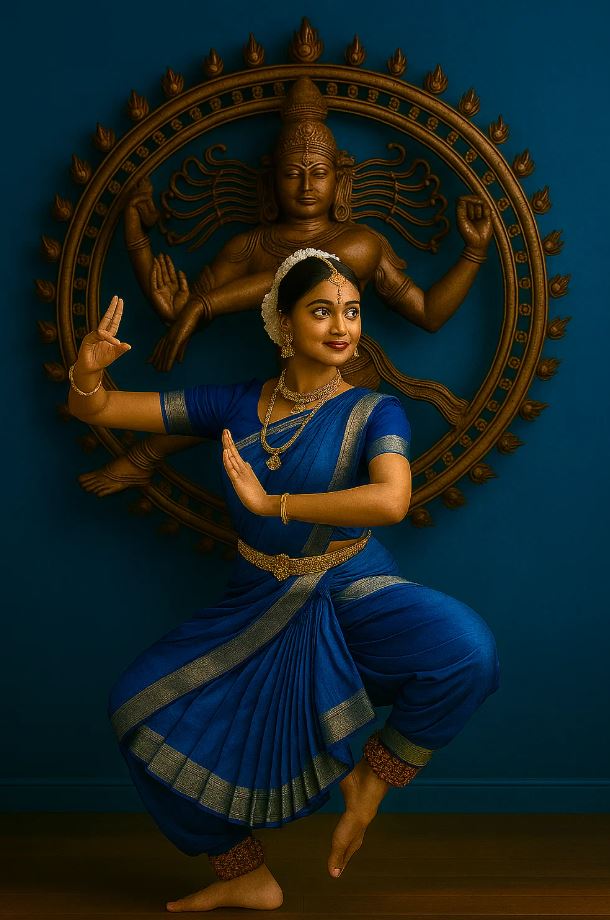
BACHELOR'S DEGREE TRAINING
An undergraduate (UG) degree in Bharatanatyam offers students a comprehensive education in both the practical and theoretical aspects of this classical Indian dance form. It typically combines rigorous training in dance technique, performance, music, and theory, along with broader academic subjects like history, culture, and philosophy. This degree is often pursued by students who are looking to develop a deep understanding of Bharatanatyam and wish to pursue it as a career, whether in performance, teaching, choreography, or research.

MASTER'S DEGREE TRAINING
A Master of Fine Arts (MFA) degree in Bharathanatyam is a postgraduate program focused on the advanced study and practice of this classical Indian dance form. Bharathanatyam is one of the oldest and most well-known classical dance styles in India, originating from Tamil Nadu, and it is known for its intricate footwork, expressive hand gestures, and emotive storytelling through dance.